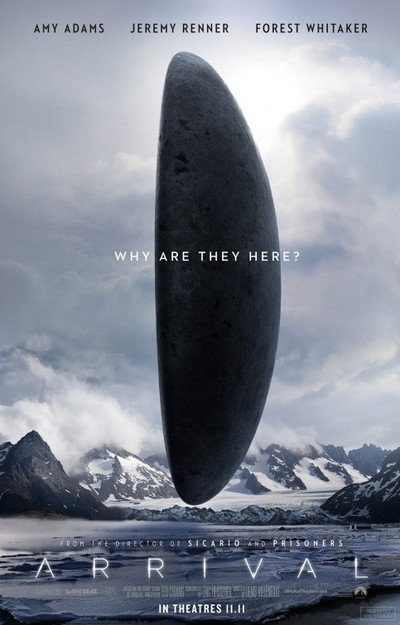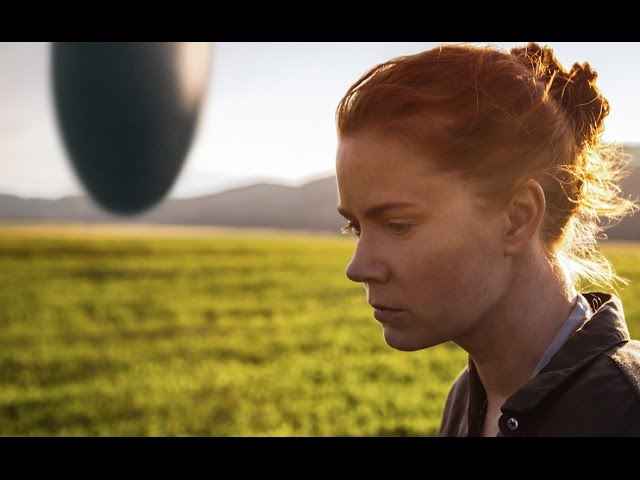 Some years ago I read Ted Chiang’s “The Life Cycle of Software Objects.” This was back before I had learned to be wary of io9, io9’s writer-darlings, and recent Hugo-winners in general. I was unimpressed, and after reading what I took to be a dismissive review of him by John C. Wright, I never really went back to Chiang. I don’t always agree with JCW (The man liked Jupiter Ascending, for crying out loud.), but what I see now is a more nuanced review of Chiang’s short fiction then confirmed what I had already felt– that there was something hollow in Chiang’s writing. The usual “pink SF has good stylists but lacks substance” sort of hollowness. But y’know what? I still like to reward movie studios when they produce actual science fiction, Tuesdays are $5 movies all day at the local theaters, and I had an evening free. So I went to see “Arrival,” based on Chiang’s “The Story of Your Life.” Also, Amy Adams is the world’s third prettiest living woman, after my wife and Christina Hendricks. So there’s that.
Some years ago I read Ted Chiang’s “The Life Cycle of Software Objects.” This was back before I had learned to be wary of io9, io9’s writer-darlings, and recent Hugo-winners in general. I was unimpressed, and after reading what I took to be a dismissive review of him by John C. Wright, I never really went back to Chiang. I don’t always agree with JCW (The man liked Jupiter Ascending, for crying out loud.), but what I see now is a more nuanced review of Chiang’s short fiction then confirmed what I had already felt– that there was something hollow in Chiang’s writing. The usual “pink SF has good stylists but lacks substance” sort of hollowness. But y’know what? I still like to reward movie studios when they produce actual science fiction, Tuesdays are $5 movies all day at the local theaters, and I had an evening free. So I went to see “Arrival,” based on Chiang’s “The Story of Your Life.” Also, Amy Adams is the world’s third prettiest living woman, after my wife and Christina Hendricks. So there’s that.
The arriving aliens show up out of the blue one day in 12 ships parked at random spots across the globe. They don’t communicate in any way we understand; they don’t appear to be machines in any way that we understand, looking like smooth stones or sea shells of some sort. Every 18 hours, a door opens up in the bottom of the ship, allowing human beings access to an empty room with a glass divider separating our atmosphere from the dense, smoky atmosphere of the aliens– who faithfully come for each visit, but are only barely glimpsed and usually not communicating in any meaningful way. The first real breakthrough comes with the arrival of Amy Adams’ character– Louise Banks, a gifted linguist– who decides the best course of action is to teach the aliens how to read English– and the aliens respond by teaching her how to read their language.
That’s the trailer version of the movie; the actual film focuses closely on Adams’ protagonist. The film actually opens with the whole “This is the story of your life” bit, directed at Louise’s daughter– who, after a few minutes, is revealed to have died as a young teen from an illness of some sort. This haunts Louise throughout the course of the film, coloring her interactions with the aliens and her fellow researchers.
I’m on record somewhere or another sneering at “literature.” The first story I ever sold was actually written for an undergrad creative writing course that attacked literary fiction’s “character over everything else” focus. There’s a lot to be said for making a character arc important; Star Trek: Deep Space Nine‘s pilot was better than most of Star Trek‘s other pilot episodes because it gave Sisko a character arc. The events of the episode actually mattered to him. Conversely, though, the first place where modern SF really started going wrong was in trying to obtain the approval of literary types by adopting the focus on character. Some authors get how to balance character and everything else; Dan Simmons’ Hyperion is literally all about the characters, but still tells an interesting story. Many of them, though, fall flat and forget to write the darned story while they’re doing the literary character dance. My experience with “The Life Cycle of Software Objects” suggested Chiang to fit into this category, and maybe he does; movies usually change things a lot. Arrival, however, doesn’t forget to tell us the story while we’re watching Louise’s character arc. What could easily have been something like a pointlessly artsy, navel gazing indie flick is actually a story that’s surprisingly tense and surprisingly anxious given that the fact that 90% of the action revolves around grammar.
I’m not typically fond of calling movies or books “thought provoking” or “challenging.” Most of the time they’re not. But Arrival actually left me having to process how I felt afterwards, and I’ve got to give it props for that. I didn’t really come out on buzzed or excited, and my first reactions to the major plot twist were on the negative side. Spoilers ahead, so stop reading if you haven’t seen the film and want it unspoiled. (Your takeaway for now should be that it’s worth seeing.)

Alright. Spoilers: Arrival‘s linguistic drama hinges on the Sapir-Whorf Hypothesis, which states that language dictates how you think and feel. Most linguists that I’ve known (I flirted with the idea of pursuing linguistics in undergrad.) don’t buy into the hard interpretation of Sapir-Whorf, prefering to say that language influences your thought. For Arrival, the plot hinges on the revelation that the alien’s language doesn’t have any sense of time. Their writing is done in smokey circles that look vaguely like the inscriptions on the One Ring, and their sentences have to be understood as a whole, rather than sequentially. What this means for Adams is that learning the language has shaped the way she thinks so that she shares the alien’s non-perception of time, and about 3/4 of the way through the film, she asks , “Who is this child I keep seeing?”
The dead daughter hasn’t yet died; she hasn’t even been born yet. It was a neat enough twist, well delivered, but my first reaction was to sigh and think, “But of course it can’t be a happy life for them; that wouldn’t be ‘real,’ and so not literary.” After I mulled it over, though, I realized that Louise’s decision not to do anything different about the future– to allow her daughter to be born, knowing that their time together is limited and doomed to end in grief– was a such a surprisingly pro-life position that I couldn’t help be startled by the fact that it was coming from a Hollywood film. I’m sure they never thought about it in those terms, and I more or less gather that Chiang isn’t a religious fellow, but it was such a surprisingly Catholic position on the value of life that I’m still a little floored that I haven’t heard anyone complaining yet.
All in all, as I said, it’s a great movie. Thinking science fiction films tend to be few and far between, and this is a worthy installment in that august pantheon.
Josh Young is a seminary student, Castalia House author (featured in God, Robot and author of the forthcoming Do Buddhas Dream of Enlightened Sheep) and blogger at Superversivesf.com. He can be reached on Gab.ai @BadgerSensei. If you enjoyed this, we’d love to have you visit our main site!
Chiang is a bitter man who hates goodness and beauty in any form. Reading his collection is an exercise in shaking your head at those who seek to despair.
-
Hehe, I was actually tricked into buying his collection of short stories due to folks claiming how beautiful they are. Someone even made a Cordwainer Smith comparison that impressed me back then, though I can’t ever remember if that came from a review or some comment. Boy oh boy, was I wrong…
Josh, thank you for another good review. I enjoyed the movie and it’s disappointing to read that Chiang’s material isn’t as good as the film. I was going to get his book this week but I’ll pass.
I’ll save the $ and spend it on the next Chara book by Ben Zwycky.
I loved this movie, despite the superfluous jabs at Christians and right wing radio.
That said, why in the world would any military believe itself capable of defending against an advanced alien species who has mastered FTL travel? It’s so stupid.